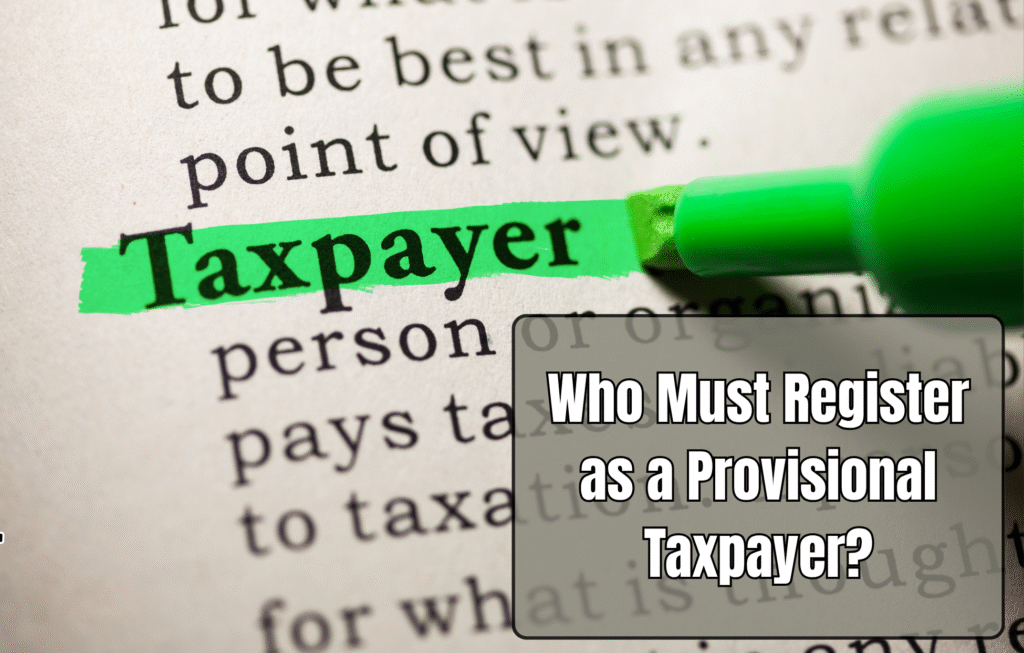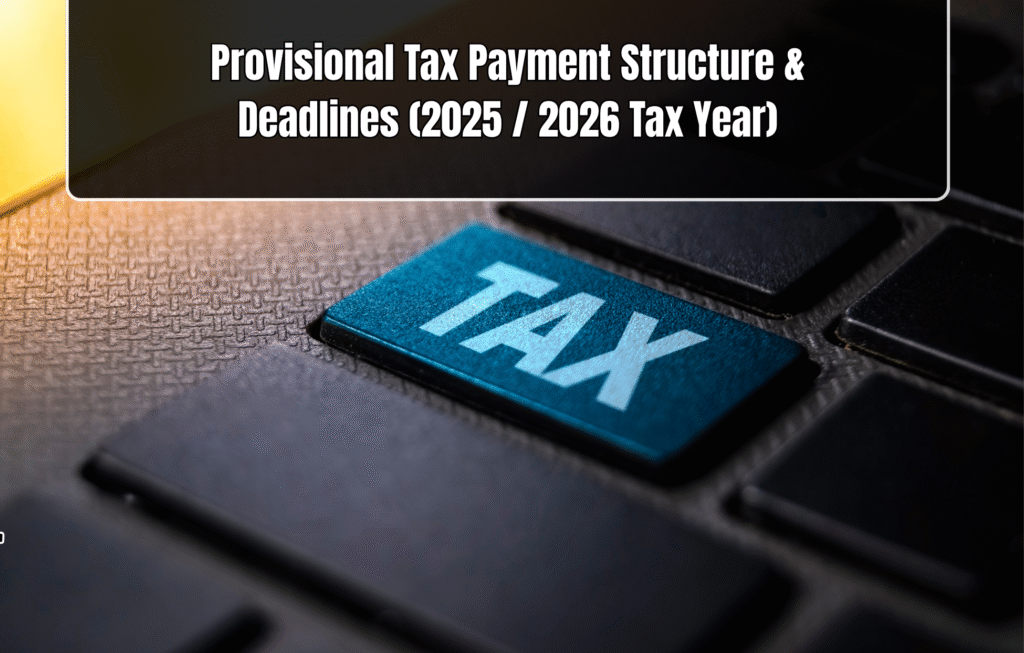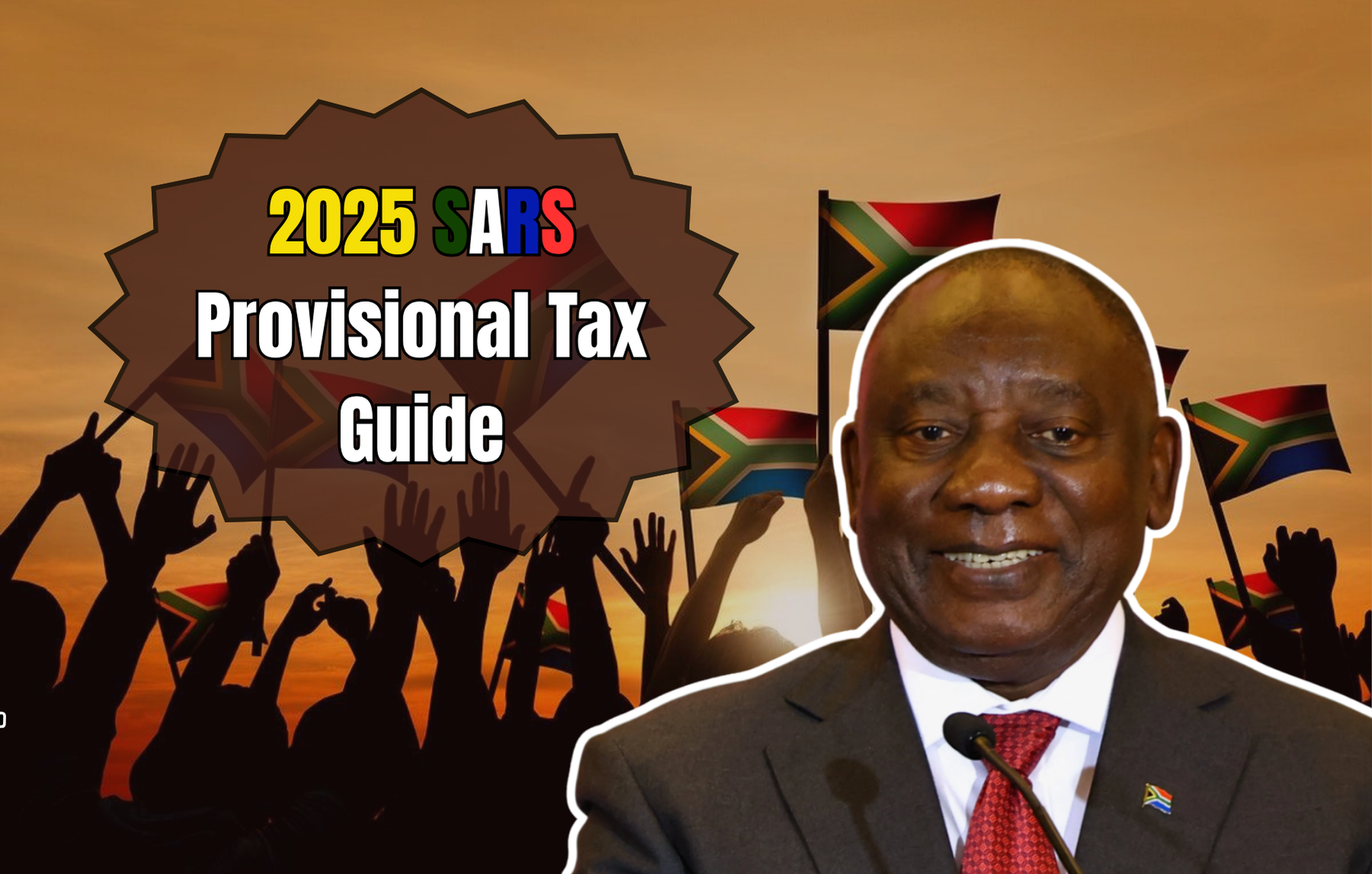SARS Provisional Tax in South Africa (2025 Guide)
This is a detailed and up-to-date guide on SARS Provisional Tax in South Africa as of 2025 — covering what it is, who must pay, how to estimate and file, important deadlines, recent changes, penalties, and compliance tips.
What Is Provisional Tax?
Provisional tax is not a separate tax, but a mechanism by which SARS ensures that taxpayers who have income not subject to PAYE pay income tax in advance, in installments. It spreads your income tax liability through the year rather than accumulating a large lump sum due only at year-end.
It mainly applies to individuals and entities whose taxable income includes amounts not subject to withholding, such as business profits, rental income, investment income, and consulting fees. It also applies to companies and trusts, unless specifically exempt.
If you are a salaried employee whose entire taxable income is taxed via PAYE (Pay As You Earn) and you have no substantial additional income, you may not need to submit provisional tax.
Who Must Register as a Provisional Taxpayer?

You are required (or may be required) to register as a provisional taxpayer and submit provisional tax returns if:
- You derive income not subject to withholding, such as business income, rental, freelance work, interest, or dividends beyond certain thresholds.
- You are a company or trust, unless specifically exempt.
- You have previously been designated by SARS to be a provisional taxpayer.
- You received a SARS letter or notification indicating you must submit IRP6 returns.
Some taxpayers are automatically designated as provisional taxpayers by SARS based on their income profile. In 2025, SARS is allowing certain provisional taxpayers to participate in its Auto Assessment program, which means SARS may prefill their assessment based on third-party data if they express interest.
Even if your provisional tax liability for a period is “nil,” you may still need to file the IRP6 return for compliance purposes.
Key Changes for 2025 Filing Season
Important updates that affect provisional tax in 2025 include:
- Certain provisional taxpayers can now participate in SARS Auto Assessment, previously only available to non-provisional taxpayers.
- From 1 March 2025, section 6quat of the Income Tax Act allows unused foreign tax credits for capital gains tax to be carried forward for up to six years.
- From the same date, new reporting under sections 11(nA) and 11(nB) is required, and employers must include this in IRP5 / IT3(a) certificates.
- The definition of “provisional taxpayer” has been expanded, including labour brokers who previously had an exemption certificate.
These changes require taxpayers to re-evaluate whether they now qualify or are newly obligated to submit provisional tax returns.
Provisional Tax Payment Structure & Deadlines (2025 / 2026 Tax Year)

Below is the schedule for provisional tax returns and payments for the 2025/2026 tax year:
- First provisional payment (IRP6): 31 August 2025
This covers estimated tax for part of the year. - Second provisional payment (IRP6): 28 February 2026
This covers the remaining tax for the year. You can top up your payment if your first estimate was too low. - Optional third/top-up payment (if needed): 30 September 2026
If your second estimate was insufficient, this payment helps you avoid penalties. - Annual income tax return (ITR12): For provisional taxpayers, filing is open from 21 July 2025 to 19 January 2026.
The filing season for non-provisional taxpayers opens on 7 July 2025 and closes on 20 October 2025. Some provisional taxpayers may be eligible for auto-assessment if they opt in.
How to Estimate & File Your Provisional Tax (IRP6)
Estimation Process:
- Project your taxable income for the full year based on actual figures or reasonable estimates.
- Apply the applicable tax rates, taking into account all deductions, rebates, and credits.
- Deduct PAYE or other taxes already withheld or paid.
- Divide the tax liability across installments — the first in August, the second in February.
- Adjust the second estimate if necessary and use the optional third payment to avoid penalties.
Filing via eFiling:
- Log in to SARS eFiling.
- Navigate to “Returns” > “Returns Issued” > “Provisional Tax (IRP6).”
- Select the relevant period (First or Second).
- Enter your income estimate, deductions, and calculate the tax payable.
- Submit the return and pay the amount via EFT or online banking.
Even if no tax is due, submission may still be required for compliance. Maintain documentation supporting your estimates, such as income statements and expense records.
Late Submission, Underpayment Penalties & Interest

If you submit late or underestimate your taxable income, SARS may impose:
- Administrative penalties for late or non-submission.
- Underpayment penalties, usually 20% on the underpaid amount if total provisional payments fall below 90% of your final tax due.
- Interest, which accrues daily on any late payments.
- Audit risk, as frequent errors or underpayments could attract SARS scrutiny.
Example: If your final tax is R100,000 but your provisional payments add up to only R60,000, you may face a penalty and interest on the R40,000 shortfall.
Even if you estimate that no tax is payable, failure to submit the IRP6 form may still trigger penalties.
Interplay with Annual Income Tax & Refunds
- Provisional payments are credited against your annual tax liability in your ITR12.
- Overpayments result in a refund, usually processed within 72 hours if your banking details are correct and no audit is triggered.
- If you’ve underpaid, the remaining balance will be due once your ITA34 assessment is issued.
- SARS may audit your return, requiring you to submit supporting documents within a specified timeframe.
Common Questions & Practical Tips
- What if you’re unsure whether you’re a provisional taxpayer?
Check your eFiling profile. If it says “Provisional Taxpayer = Yes,” you are obligated to file. If in doubt, consult SARS or a tax professional. - What if your income is uncertain?
Use conservative estimates to avoid underpayment penalties. You can update your estimate for the second payment or use the third payment option. - Do I need to file IRP6 even if tax payable is zero?
Yes. Filing may still be required even when no tax is due to avoid penalties for non-compliance. - What if you miss a deadline?
File and pay as soon as possible. Penalties and interest may apply, but acting quickly reduces your risk. - Should I keep supporting documents?
Absolutely. Keep invoices, income records, bank statements, and receipts — these may be requested in case of a SARS audit. - Do I need a tax practitioner?
If your tax affairs are complex — multiple income sources, international income, capital gains, etc. — a tax professional can help you stay compliant and avoid costly mistakes.
Summary & What to Watch for in 2025
- Provisional taxpayers must make two payments (August and February), with an optional top-up in September.
- SARS is rolling out Auto Assessment for some provisional taxpayers in 2025.
- Law changes include foreign tax credit carry-forwards and employer reporting requirements.
- Missed submissions or underestimates can result in stiff penalties and interest.
- Always file your ITR12 annual return and make sure your provisional tax status on SARS is accurate.
- If unsure, consult SARS or a qualified tax practitioner.
This guide helps you navigate provisional tax confidently for 2025. If needed, consider using SARS’s digital platforms or seeking professional assistance to stay compliant and penalty-free.
FAQs
1. What is provisional tax in South Africa?
It’s a system where individuals or entities with non-PAYE income prepay their tax in two or three instalments during the year, avoiding a large year-end lump sum.
2. Who must pay provisional tax?
Anyone earning income not fully taxed via PAYE—like rental, freelance, or investment income—or registered companies and trusts, unless exempt, must register and file IRP6 returns.
3. Is provisional tax a separate tax?
No. Provisional tax isn’t separate—it’s a prepayment mechanism toward your annual income tax liability. It reduces your final payment due when filing the ITR12 return.
